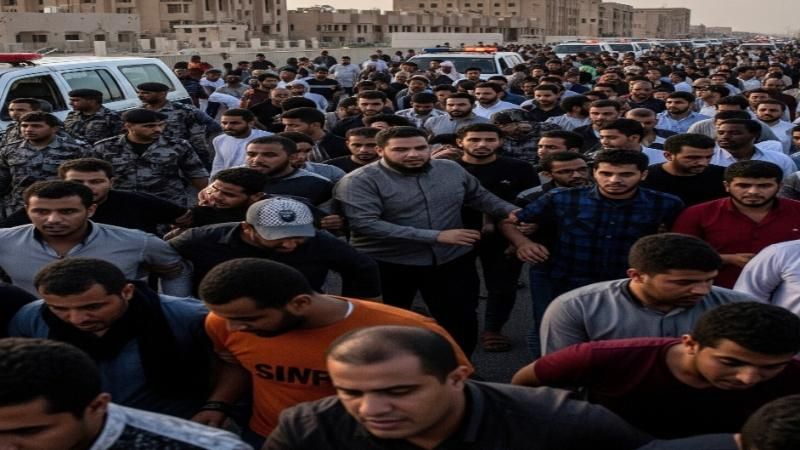The silence on the other end of the line has become a deafening echo for thousands of families across the globe, particularly in Bangladesh. Saudi Arabia's recent, sweeping nationwide campaign has seen over 21,000 individuals arrested for violations of residency, labor, and border security regulations, with 10,000 already deported. While the official figures don't break down nationalities, it is estimated that a significant number, likely in the thousands, are Bangladeshi nationals, given the large Bangladeshi expatriate community in the Kingdom, Daily Dazzling Dawn understands.
For families in Bangladesh, the news of these arrests isn't just a headline; it's a direct blow to their survival. Many households are entirely dependent on remittances sent by their loved ones working in Saudi Arabia. These arrests mean an abrupt halt to the financial lifeline that pays for food, education, medical expenses, and daily necessities.
"My son called me last week, he was so worried about the crackdown," whispered Fatima Begum, her voice trembling, from her small village in Sylhet, Bangladesh. "Now, his phone is off. We don't know where he is, if he's eaten, if he's safe. He's our only hope. How will we live now?" Her fears are mirrored by countless others.
The crackdown, which saw over 12,500 individuals in breach of residency laws, 5,500 for border-related offenses, and nearly 3,000 for labor violations, has left a trail of emotional devastation. Border security units intercepted 2,072 people attempting to cross into Saudi Arabia illegally, with 47% being Yemeni and 52% Ethiopian, but the number of those already inside the Kingdom and now detained includes a diverse array of nationalities, among them a substantial number of Bangladeshis.
The Ministry of Interior reported that over 14,000 violators are currently undergoing legal procedures, with approximately 12,400 of them men – often the primary breadwinners. While 6,200 individuals have been referred to their respective diplomatic missions for travel documents and 3,300 are finalizing departure procedures, the 10,000 already deported represent families who have been stripped of their main source of income overnight.
The Road Ahead for Grieving Families:
For the families of those arrested or deported, the path forward is fraught with uncertainty and immense hardship. The most pressing issue is the immediate financial crisis caused by the sudden loss of income. Families are forced to deplete meager savings, borrow from relatives, or seek help from local charities, often facing the agonizing choice between basic necessities and keeping their children in school.
Beyond the financial strain, there's a profound emotional and psychological toll. The constant anxiety about their loved one's well-being, coupled with the shame and stigma some might feel, can lead to severe emotional distress, depression, and even health problems. Children, in particular, are deeply affected by the sudden absence and financial strain. Families often struggle to get accurate information about their arrested relatives, relying on unofficial channels, often at great personal expense, to try and locate them or understand their legal status. This prolonged uncertainty only deepens their anguish.
In many instances, the immediate community and extended family become crucial support systems, pooling resources, offering emotional solace, and helping navigate the complex process of seeking information or preparing for a loved one's return. However, even if a family member is eventually released or deported, the financial and emotional scars can linger for years. Many returnees struggle to find employment in their home country, further exacerbating the family's economic woes, as the dream of a better life, once promised by overseas work, often turns into a bitter reality.
Saudi authorities have reiterated severe warnings against those who facilitate illegal entry, transport, harbor, or employ violators, with penalties including up to 15 years in prison, hefty fines, and confiscation of property. While these measures aim to enforce law and order, for the families caught in the crossfire, the consequences are deeply personal and profoundly heartbreaking. They are left with shattered dreams and the daunting task of piecing their lives back together, one agonizing day at a time. The international community, and particularly the Bangladeshi government, faces a critical challenge in supporting these vulnerable families and advocating for the rights and safe return of their citizens.







.svg)
